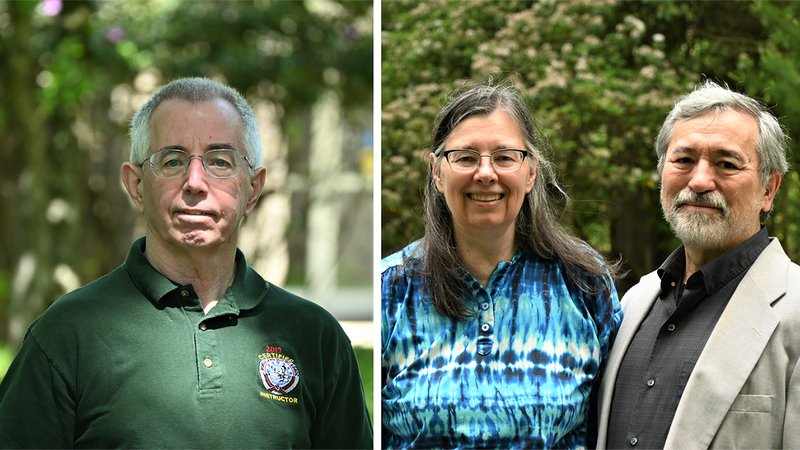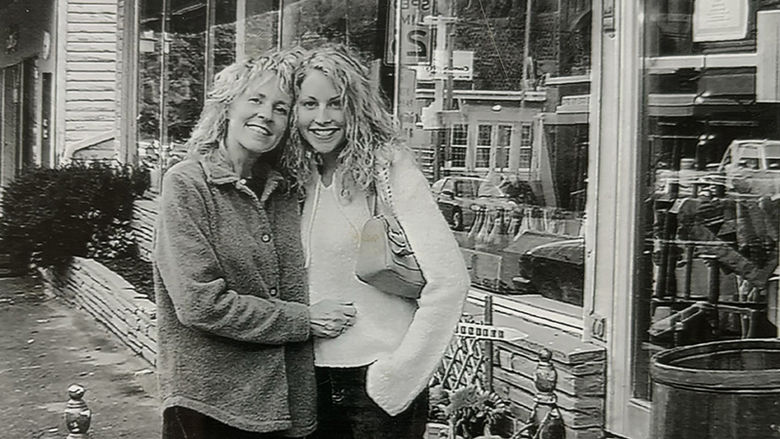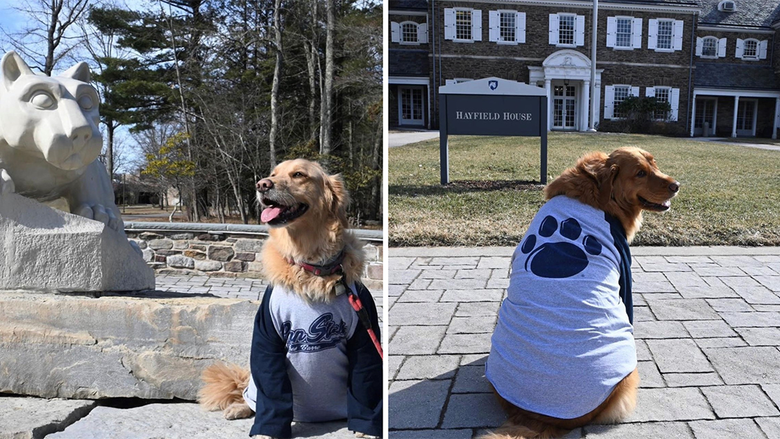

This dialog contains the full navigation menu for this site.

Penn State Wilkes-Barre is known for having dedicated faculty and staff members, many of whom spend their entire careers serving students at the small campus.
Dudley Snyder, David Chin and Lorna Chin embody that commitment to students, having spent a combined total of more than 80 years at Penn State Wilkes-Barre. All three are retiring and said that while they are looking forward to the next chapter, they will miss the family atmosphere and students at the campus.
“Dudley, David and Lorna display the rich and diverse backgrounds that are emblematic of Penn State Wilkes-Barre faculty and staff,” said Interim Chancellor Lynda Goldstein. “We applaud their commitment to our students. While we will miss them and their wealth of knowledge greatly, we wish them all the best in their retirement.”
Assistant Professor of Chemistry Dudley Snyder came to Penn State Wilkes-Barre in 1981 after earning his Ph.D. in organic chemistry from Purdue University and bachelor’s degree in chemistry from the University of Pittsburgh. A native of southwestern Pennsylvania, he felt the Wilkes-Barre area was similar to where he had grown up and liked the close-knit feel of Penn State Wilkes-Barre.
“I’m from a coal-mining town and when I came to this area for the first time, I thought how familiar it seemed. That made things a lot easier,” Snyder said. “I liked that this campus was a smaller environment, where I would work more closely with students. I also liked the idea of being part of Penn State and the sense that you were part of something bigger.”
He first became interested in chemistry in high school, finding it a “fascinating field” and discovering he had a natural ability for it. At Penn State Wilkes-Barre, Snyder has taught all general chemistry and sophomore organic chemistry lectures and labs. He has also developed a new course in Materials, Energy & Science as a GNS elective as well as Introductory Forensic Chemistry for the administration of justice program. Dr. Snyder’s research has primarily been in silicon chemistry, specifically in the development of new synthetic reactions. For 13 years he served as regional director for the Pennsylvania Northeast Regional Science Olympiad, held annually at Penn State Wilkes-Barre.
“I will miss the satisfaction of helping the students and the chance to chat with people throughout the course of the day,” he said. He noted that employees at a smaller campus “have to wear multiple hats in order to make things function,” adding that his colleagues were always willing to help, keeping students’ best interests in mind.
“There has always been the wonderful feeling that if you needed something, all you had to do was walk down the hall and ask. You never got the feeling you were left on your own,” he said. “At larger schools, you might know only people in your group or department. But here, you know literally everyone.”
Snyder has seen many changes in his 40 years at Penn State Wilkes-Barre, especially the infrastructure at the campus.
“When I came here, there were only four buildings: Hayfield House, a classroom building (now the Murphy Student Services Center), the Science Building, and the original carriage house, which is the front part of the Student Commons now,” he recalled. “At this point, the campus truly does have everything that a college campus should have. It is a perfect environment that has everything that a student would associate with a college campus. The setting we have out here in the country is very beautiful.”
In his retirement, Snyder plans to continue training and teaching martial arts. He earned his first-degree black belt while in graduate school and has remained active ever since. He received the Region 8 Hall of Fame Award as Instructor of the Year (4’th Dan) in 2008. In 2018, he successfully tested and was promoted to fifth-degree black belt. He also wants to travel, particularly to the national parks. He has hiked in the Grand Canyon, Yosemite, Glacier, Zion Canyon, and Death Valley national parks and looks forward to exploring more parks in retirement.
Lorna and David Chin
Associate Professor of English David Chin joined the campus faculty in 1994 after completing his Ph.D. in English at the State University of New York at Binghamton. His path toward becoming an English professor was decidedly untraditional, starting with his bachelor’s degree in biology from Antioch University in Ohio, where he met his wife, Lorna.
“Before I completed my degree at Antioch, I was accepted at SUNY College of Optometry in New York City and planned to be an eye doctor,” Chin recalled. “I completed one semester but asked myself if I wanted to do this for the rest of my life. I came to the conclusion I wanted to do other things and applied to Columbia University’s master of fine arts in creative writing program, which I finished in 1980.”
After he obtained his MFA in creative writing, he returned to science, working in the field for another 12 years in positions including lab technician, research assistant and scientist. He worked at Memorial Sloan Kettering Cancer Center, Bristol Myers and Cetus doing cancer research. His last science position was at Norwich Pharmaceuticals in the bone metabolism department. After that, he felt he hit a career plateau and knew the next step would be to get a Ph.D. in science, but instead felt a calling to earn a graduate degree in English.
At Penn State Wilkes-Barre, Chin has taught a wide range of courses, including creative writing, rhetoric and composition, American literature, technical writing, and Asian American literature.
“I later taught technical writing, which all my science background really prepared me to teach,” he said.
Early in his time on campus, Dr. Chin and several colleagues started a summer program for students needing improvement in basic English and math skills. That program is what brought his wife, Lorna, into the Penn State Wilkes-Barre fold.
Through that program and throughout his teaching career, David Chin has always prioritized helping students succeed.
“When students learn something, accomplish a task, win an award, complete a successful internship, get into graduate school, or get their first job, I often hear from them,” he said. “For me, that is the most satisfying aspect of my whole career: knowing I have mattered in some way to their career or acquiring credentials.”
“Having raised a daughter who’s now in her 30s, I have enjoyed the advantage over the last 10 to 15 years of having an insider to tell me what was going on with students,” Chin said. “I have a perspective from being a parent that allows me to get a different view of students than just what I think.”
He said courses and majors have continued to evolve in his 28 years with Penn State Wilkes-Barre, which now offers nine bachelor’s degrees and four associate degrees.
“There have been changes to the curriculum, with Penn State responding to various changes in the world and therefore offering new degrees as needed,” Chin described. “I think Penn State has been attentive to what is needed and what set of skills is important at any given time by offering new majors.”
David and Lorna Chin, who celebrated 41 years of marriage in April, have worked together at Penn State Wilkes-Barre since 1995. David Chin said he enjoyed the opportunity to once again share a workplace with Lorna like they did in a lab in the past.
“We’ve had a long history of working together in laboratories, and it’s been fantastic working together again,” he said. “It’s nice that between the two of us, we can keep up with what’s happening on the campus. I hear her perspective that comes a little more from the staff side and she hears my perspective from the faculty side.”
“It’s like sharing an extra lifetime with someone. You share their work life in addition to sharing a home life, and this doubles the amount of time I can spend with my wife,” he continued. “There are many advantages to our situation, too. I can encourage my wife to reach out to a student who may need help. And we get to commute in only one car.”
David Chin said the couple didn’t initially plan to retire together, but the pandemic sped up their plans a bit.
“People often have concerns about both spouses retiring at the same time because they won’t know how to adjust to spending all that extra time together, but I think the pandemic and lockdown took that question right out of our minds,” he said. “It worked out and the timing was good, so we decided we might as well both retire rather than wait two extra years like I had first thought I would.”
The pandemic also delayed the peer review process of his book, “Family History and Intersectionality.” He plans to make requested revisions during his retirement.
“The book is about my own family history and biraciality and covers a lot of topics, including how we view ourselves and what role we see as members of a family with a particular history and how that history fits into the national history,” Chin said. “What do we make of these stories that we inherit? It examines all of those things and tries to bring it to life with my personal narrative.”
He plans to continue writing poetry and reading and pursuing intellectual interests after he is retired and also wants to devote more time to smaller hobbies and spending time with his family.
“I’ve already been through one career change in moving from science to English and that was a pretty emotionally intense experience, dropping what you’ve been doing for a long time and starting something new while wondering if you’ll be successful at it or not,” Chin said. “With that behind me, I look forward to this new part of my life with Lorna.”
Lorna Chin’s time at Penn State Wilkes-Barre began with the summer program David and his colleagues established in the mid-1990s. When they needed a math tutor, Lorna was hired for the position in 1995. That fall, she was hired in the Learning Center as a part-time staff assistant, which led to her eventual role as coordinator at the Learning Center, a position she has now held for 12 years. In each role, her skills have benefited students.
Chin holds bachelor’s degrees in biology and chemistry from Antioch University. After graduating from college, she worked on cancer research for about seven years. She worked at Memorial Sloan Kettering Cancer Center in New York City in a laboratory researching cell biology. Chin later worked in a research lab in California on an early cancer treatment drug, interferon-gamma, that “had promise, but too many side effects,” she said. Interferon-gamma is currently used as a treatment for two specific genetic disorders. Its potential use as a cancer treatment is still being researched.
After her daughter was born and after a short stint as a tax accountant, Chin obtained a master’s degree in counseling from the University of Scranton.
“I feel what I learned there has helped me immensely in my work here,” she said. “It really helped me work with students with challenges or students who are hesitant and don’t think they can do a particular task.”
Her variety of roles in the sciences, math and counseling combined to make her an ideal tutor and leader of the Learning Center, where her job involved “a little bit of everything.”
“Running the Learning Center also involves hiring and mentoring peer tutors and creating schedules,” said Chin, who also did a lot of the tutoring herself.
Although she was happy to tutor any student who requested help, Chin’s main focus was working with students who learn in an atypical way. “I liked to help them as much as I could,” she said.
These students often needed intensive tutoring and a creative approach to learning. “I felt I was able to make a difference in many cases like that,” Chin explained.
Chin tutored students in math, chemistry, and biology, in addition to numerous general education subjects. Her degree in counseling also gave her the knowledge she needed to help students in psychology, sociology, and other social sciences.
She developed relationships with learning centers at other Penn State campuses and their coordinators, allowing them to coordinate and ask for help when necessary. Virtual tutoring, which became a necessity during the pandemic, allowed campuses to share tutors across a variety of subjects.
In addition to her position in the Learning Center, Chin was involved with the campus choir and Arts at Hayfield, a nonprofit organization that promotes the arts on campus and in the community. She now serves as a member of Arts at Hayfield, helping plan its two annual festivals in addition to other events.
Chin said the campus atmosphere has always been “friendly and accommodating,” which she appreciated as a mother.
“Penn State Wilkes-Barre is a place where you feel at home. I have wonderful colleagues and friends here whom I will really miss in retirement,” she said. “Most of all, I’ll miss working with the students. They were absolutely my favorite part of my job. It’s been a great run and I’ve enjoyed my time here very much.”
In retirement, Chin plans to work on home projects and enjoy relaxing and spending time with her daughter, who lives in Phoenixville.
“I’m looking forward to doing things on my own schedule and being able to relax and still get things done,” she said.

